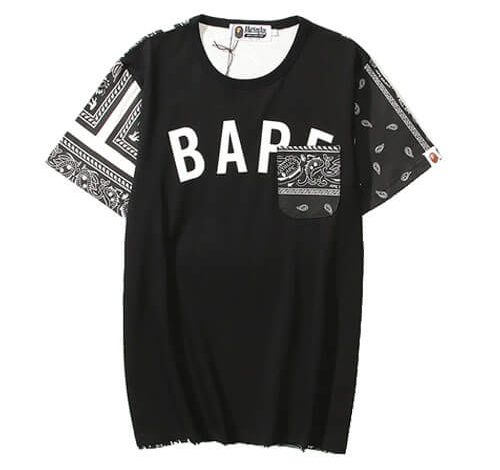Rise of the Fashion T-Shirt

Bape T-shirts have recently been reborn as high fashion statement pieces for both men and women, striking a chord with consumers and offering fashion businesses unmistakable opportunities for commercial success. The Board of Fashion investigates.
Today, the T-shirt is one of the most universally worn articles of clothing. It originated as an article of underwear for men and now plays a complex role in modern fashion. In addition to being cheap, hygienic, and comfortable, the T-shirt has become an essential basic wardrobe item worn by individuals of all ages and social classes. Technology-wise, the T-shirt evolved and spread at an astonishing rate, thanks to the increased availability of American cotton in the mid-nineteenth century and the invention of the circular knitting machine. Over two billion of these garments were sold in 2004. The garment’s present shape and style developed during the 1930s and became universally worn as an outer garment after World War II. The current versions can range from inexpensive multi-packaged units to haute couture editions to high-tech fiber versions used for health and fitness
A primitive type of “Bape T-shirt.”
Shirts with a T-shaped construction were worn as early as medieval times to protect the body from chafing by heavy, metal armor that sat on the body. People adopted the shirt as a protective and hygienic barrier between the body and their expensive clothing. Cotton or linen shirts were easier to wash than silk or woolen outer garments with elaborate ornamentation. The seats of shirts with long tails served as underwear. Shirts were always worn with vests or waistcoats and jackets. When a gentleman wore a clean, laundered shirt, he showed off his wealth and class. Since their introduction in medieval times through the middle of the nineteenth century, shirts have remained essentially the same in their shape. In addition to being loose-fitting, they were made of woven fabric, and their construction consisted of rectangular pieces arranged into a T shape.
Physicians and doctors recommended wearing warm undershirts during the late nineteenth century to prevent colds and rheumatism. He developed his line of knit undershirts lauding the health benefits of wearing wool underwear. Circular knitting machines were patented in 1863, allowing broad distribution of knit jersey undershirts and hosiery. This technology made undergarments more varied and refined. Compared with earlier loose-fitting woven shirts, this shirt had a closer fit.
Printed T-shirts for sports by Bape
As sports and leisure activities increased in the 19th century, new clothing styles were developed. One is used to seeing more skin and one’s body shape in public with a close-fitting knitted woolen swimsuit that resembles a tank-top undershirt. During the 1930s, T-shirts became a standard piece of sporting apparel among colleges and universities. For some time, shirts printed with school logos were worn by school sports teams as uniforms. It was due to this new casual dress in the middle classes that resulted in the T-shirts’ general acceptance these sport uniforms became popular. This t-shirt has remained a mainstay of sports activities because it is highly absorbent, quick-drying, and allows for freedom of movement. In sports, T-shirts play an increasingly important role beyond the identification of teams and the function of providing practical comfort. T-shirts are essential to the marketing, promotion, and profitability of the sports industry as a whole.
Message shirts and popularization
Since T-shirts were first introduced in the 1960s and 1970s, they have evolved and proliferated rapidly. In the 1960s, decorative techniques to create explicit statements on T-shirts became increasingly popular. Designs, novelty patterns, and written words lionize rock ‘n’ roll bands, promote products and places, and express political and community-oriented causes. Imprinted T-shirts can be produced quickly and cheaply, responding to widespread and political events. Shirts bearing the slogan “Dew it with Dewey” were distributed by the Republican candidate Thomas Dewey in 1948. Milton Glaser created one of the most popular and widely copied designs, “I Love New York,” in 1976.
The Making of Your Bape T-Shirt
A T-shirt is a timeless, classic, and versatile garment that is a staple in many closets due to its durability, classic style, and versatility. Usually cotton is grown in U.S. or Indian cotton fields to make T-Shirts. Cotton is the most common material, but polyester and blends of cotton and polyester can also be found. Stretchy knit fabrics or jersey, which are comparatively inexpensive, and great for screen printing and heat transfer, are standard fabrics used by designers. A T-shirt must undergo several processes before your favorite retailer stocks it.
The A Bathing Ape Store (BAPE) also carries top-of-the-line BAPE sweaters. In BAPE stores you can find A Bathing Ape sweaters and a wide variety of other BAPE products. Among fashion lovers’ favorite sweaters are many BAPE sweaters. Featured in this section are classy hooded sweaters. Embroidered or printed logos are all that appear on this section of sweaters.





